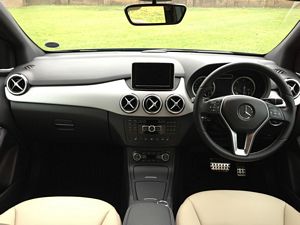|
By accessing or using The Crittenden Automotive Library™/CarsAndRacingStuff.com, you signify your agreement with the Terms of Use on our Legal Information page. Our Privacy Policy is also available there. |

Why are modern car's pedals so close to the driver?
|
|---|
|
|
Why are modern car's pedals so close to the driver?
Matt Hubbard
Speedmonkey
July 11, 2013
 Mercedes' B-Class pedals sit far too high Mercedes' B-Class pedals sit far too high
|
I've noticed a growing trend, based on nothing more than driving several new cars, for the pedals, and in particular the brake, to be positioned far too close to the driver.
This seems to be most prevalent amongst hatchbacks - in particular the Mercedes B Class and new Renault Captur. These cars are designed to cater for all shapes and sizes and I understand that drivers from 5"2' to 6"10' need to be able to drive them. I am 5"10' by the way.
The problem appears to stem from the increasing height of cars. The engine is stuffed into an ever smaller space and ever further back, in the name of crash protection and all the gubbins required for emissions and other regulations. The bulkhead sits further back and there is less room for the pedals.
This is then compounded by taller seat height and we are left with a seating position similar to that of a Ford Transit van but without the subsequent distance from seat to pedals. i.e. in a van there is sufficient distance for the lower leg to dangle from the seat onto to the pedals whereas in a hatch the legs similarly dangle down but, without the same distance, the leg is cramped.
Increasingly, brake pedals are being placed an inch or two higher than accelerator so whilst one can operate the throttle with heel on the floor the entire right foot needs to be lifted to use the brake. This becomes tiresome.
I don't remember this in any older car I have owned (over 30, including a lot of hatchbacks).
I bang on and on about it but my preferred driving position is legs out, heels on the floor, steering wheel low. Maybe yours is different.
I drove the new Clio 200 Turbo yesterday. I got comfortable easily enough by pulling the seat back and down. It was a good fit, although the passenger behind me would have no legroom. I then hopped in the Captur and could not get comfortable. You are closer to the dash but the pedals stay in a similar position as the Clio. This is done so rear legroom is improved, which is a marketing strategy. Pull the driver's seat too far back and your arms are to far from the gearstick.
I then drove the electric Zoe. The bulkhead is much further towards the front of the car and the pedals were set in a similar position to those in the Clio. My left leg, not being used, could stretch right out and just touch the bulkhead. This is handy for long journeys when you need to stretch - although, ironically, long journeys are not possible in a Zoe.
Sports cars avoid this problem by sitting the driver low and with legs outstretched, making for a less cramped position. The fact they don't need to give back seat passengers leg room is a factor in their superiority in the leg room department.
I would urge manufacturers to give thought to this increasing trend.

















 Mercedes' B-Class pedals sit far too high
Mercedes' B-Class pedals sit far too high
